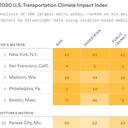Texas commuters are the top polluters

Published Date: 1/17/2020
Source: axios.com
Reproduced from StreetLight Data; Chart: Axios VisualsTransportation is a top contributor to greenhouse gas emissions, but the worst offenders aren't congested cities like New York and San Francisco. Instead, it's sprawling, car-dependent metros like Dallas and Houston, a new analysis finds. Why it matters: Even dense, traffic-choked cities can offset their carbon output with better urban planning and other, cleaner forms of transportation, says StreetLight Data, which studied mobility behavior in 100 cities to create its new U.S. Transportation Climate Impact Index.What they did: Using location-based data from mobile phones, StreetLight Data scored each metropolitan area, per capita, by six transportation factors to gain a fuller picture of their climate impact.They looked at vehicle miles traveled (VMT), transit ridership, bike commuting, pedestrian commuting, population density and circuity (the difference between an actual route taken and a straight line between A and B).Instead of counting how many bike paths each city has, they measured how much actual bike commuting people do in each city. What they found: The New York metro area has the lowest climate impact. Although commuters drive long distances to get to and from work, the widespread use of public transit in Manhattan — and lots of good old-fashioned walking — offset most of those vehicle miles traveled. Dallas, on the other hand, ranked worst because people there mostly drive to get where they're going. Houston didn't fare much better.Between the lines: Reducing transportation climate impact varies by city.For example, a dense vibrant downtown may have low car use and high walking, but if housing prices and availability force its workers to live 30 miles away, its climate impact could be higher than expected.Adding more low-cost housing downtown could be a good solution.Go deeper for a look at all 100 cities.